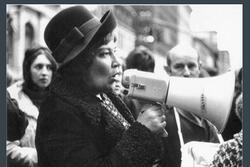Three Thought Leaders Reflect on Women’s Equality Day in 2017
On August 16, 1973 Congress passed a resolution that declared August 26 “Women’s Equality Day.” The resolution was introduced by Bella Abzug, and the date was chosen to commemorate the adoption on August 26, 1920 of the 19th amendment, which stated, "The right of citizens of the United States to vote shall not be denied or abridged by the United States or by any State on account of sex."
It has not been a steady march to a better, more inclusive, and egalitarian America since then. In 2017, ninety-seven years after women fought and won the right to have a say in who runs our country, women came together in January to stand up against hate, bigotry, and misogyny. Now, seven months since the Women’s March, we are facing even more urgent questions about women’s role in shaping history, in determining our own futures, and in making this country a more just and equitable place.
This Women’s Equality Day, we asked three Jewish feminist thought leaders to reflect on this moment in history, to help us better understand where we are, where we need to go, and how we can pick up the mantle, again, from the suffragists and Bella Abzug, and keep marching.
I remember the excitement of marching down Fifth Avenue on August 26 in 1970 to celebrate the 50th anniversary of suffrage. Simultaneously the 50,000 marchers announced to a largely unsuspecting world that a revolution in women's rights was around the corner! Nothing could stop this uprising as we called for free abortion on demand; 24-hour childcare, and equal opportunity in jobs and education. This famous strike for equality bore witness to the fact that second-wave feminism was not just a fringe movement but had captured the energies of a huge swath of women. I treasure a NY Post photo of that march with my face clearly visible (the benefits of being tall!) among the huge crowds.
Since that time, the women's movement has accomplished many of its goals, although some basic demands, like reproductive rights, remain in jeopardy. Progress in eliminating stereotypes and increasing economic opportunities and political power has been fitful. In some arenas, like that of physical safety and security, it is hard to see steady progress at all. Perhaps the greatest triumph is that consciousness of the detrimental effects of sexism and the dire need for equality is now shared across all segments of society. We have also learned that empowering women will require going beyond the repair of gender inequities to fight for justice regarding class, sexuality, and race as well, perceptions we didn't necessarily grasp as we unfurled our banners on Fifth Avenue nearly half a century ago.
Where are we? As Americans? As Jews? As Jewish women? Where are we in a time almost beyond our imaginations, a time we thought was not of America?
We are angry and frightened, we are determined and despairing, we are coming to grips with what has happened and realizing that we must be the leaders and organizers who work to bring people together and help us move forward.
We can do that with admiration for the resources which women so often display. In the fight for affordable health care, it was two Republican women in the Senate, Susan Collins and Lisa Murkowski, who signaled early on that they would not support a repeal effort that took care away from 20 million people, who showed the way in which women can lead and protect. And it was an Indian American woman of color, Indra Nooyi, as CEO of Pepsi, who urged other business leaders to resign from the president’s business council when he failed to speak forthrightly against the Nazi protesters in Charlottesville.
Women must speak up and speak out. We must organize beyond what we did in the January march. We must determine not to retreat to being overwhelmed and instead create a vision, organize with others across all lines of difference and be sure we will be able to tell our children and grandchildren what we did when our country faced its worst ever existential threat. And we must do this as women and for women, for women’s equality here and throughout the world. But we cannot do it only for women because the forces of hatred and division are emboldened and all of us must learn to stand together against them and for justice for all people.
As we approach Women’s Equality Day in 2017, I’m reminded of two lessons from the suffrage movement that resonate for me today.
The first is the necessity of perseverance. I’m thinking here not only of the brave suffragists of the 1910s, like Anita Pollitzer, who protested in front of Wilson’s White House day in and day out despite arrest and violence, but also of the women, like Ernestine Rose, who began speaking out for women’s suffrage in the 1840s. The fight for women’s right to vote in the US spanned generations, and its earliest proponents did not live to see the outcome of their work. One could find this disheartening—change takes so much time—but it is also a reminder that our impact can extend beyond our lifetime.
The second lesson is the danger of bad compromises. The suffrage movement grew alongside the movement to abolish slavery, and many early feminists understood the interrelation of oppression based on race and on sex. Ernestine Rose famously said “emancipation from every kind of human bondage is my principle.” Yet the suffrage movement was also internally riven by strategies to pit these liberation movements against one another, and the suffrage movement repeatedly sidelined African-American women and African-American freedom in order to placate Southern white politicians and suffragists. This is the tragic legacy of the suffrage movement, and it remains sadly relevant today, when competition—not solidarity—is too often encouraged. In today’s world, in which there are so many fronts on which we are called to stand up, we cannot afford to get overwhelmed or turn against our potential allies, as easy as both can be. Who would that serve? We can learn from the Jewish feminists who came before us and who straddled communities and commitments, sometimes uncomfortably, to make sure that women’s rights remain on the agenda and that women and other vulnerable communities are not set against one another.










